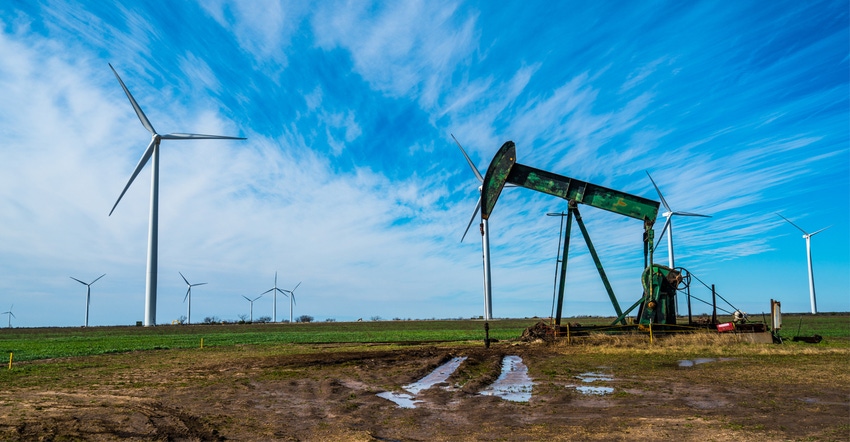April 1, 2022

After 50 years or more of conversation around renewable energy and environment, our nation is at a critical point today. The decisions made now will shape how our country develops economically, sociologically and environmentally going forward.
So why is it the conversation around energy is always phrased in a “this or that,” or “either/or” format?
In my opinion, it’s a bit short-sighted to not look at our energy production as a diverse system, with room for plenty of projects. We diversify our farms. Why not treat our energy sources in a similar fashion?
Electric vs. biofuel
I started pondering this a while back when Kansas Corn announced it was joining a petition of five other state corn associations and biofuels groups challenging the EPA’s greenhouse gas tailpipe emissions rule for cars and trucks. The rule solely considers electric vehicles, and not the benefits of ethanol and biofuels — thus tipping the scales toward electric vehicles.
“EPA’s emissions rule is basically a mandate for electric vehicles,” said Brent Roger, KCGA president from Hoxie, Kan. “The clean ethanol fuel produced from our crops is already reducing tailpipe emissions as much and more than electric vehicles. In today’s economy, Americans are looking for affordable green solutions. Ethanol fuel blends already lower the price of fuel, and lower tailpipe emissions. Liquid fuels with ethanol are the affordable greenhouse gas solution for the affordable vehicles that are used by nearly every American driver today.”
Now, that’s not to say that electric doesn’t have a purpose in our energy sources menu, either. Just that having EPA arbitrarily decide to phase out liquid fuels — biodiesel, ethanol and even petroleum — in favor of electric technology doesn’t make sense.
The corn and biofuel groups argue that policies written to exclude any technologies other than electric, stifle the innovation that could create real, sustainable change for the future. We have to crawl before we can walk. Just think of how far the technology in wind, solar, biofuel and other energy pathways has evolved in the past 20 years. Having a diverse range of energy production puts in place the economic incentives to innovate.
“It is deeply frustrating that EPA would ignore biofuels as a climate solution, and instead attempt to mandate the use of electric vehicles that are dependent on the power grid to charge their batteries made with rare earth minerals mined on the other side of the world,” Rogers said in a Kansas Corn release. “It makes more sense that green solutions would come from the green plants we grow on our American family farms.”
Biofuel vs. petroleum
I’d also argue that we cannot arbitrarily turn off the tap from the oil and natural gas industry, either.
According to the Kansas Oil and Natural Gas Producers, the industry supports about 118,000 Kansas jobs. That’s about $3 billion in family income in Kansas, and a little over $1.4 billion in state and local tax revenue.
Without petroleum fuel, we lose a valuable blending outlet for our ethanol. Natural gas fuels many of our irrigation wells. And the research and development dollars in the petroleum industry have been focused for 50 years on reducing emissions through innovation.
That research has also helped the ethanol and biofuels sectors. And without the infrastructure of fuel stations, we’d have to invest a lot more money to make sure we could fuel cars and trucks with renewable fuel, wouldn’t we?
Good vs. bad
When you get away from the lobbyists the social media posts, the memes and the self-appointed podcast experts, you see that everything comes with a trade-off.
Wind energy has a pollution image problem regarding the recyclability of turbines and blades. Solar has an image problem regarding land use for panels. Electric vehicles rely on the power grid powered by coal and use rare earth metals in their battery components. There are arguments out there against renewable fuels. And of course, petroleum isn’t an angel, either.
But the answer isn’t to avoid renewables all together. It’s also not to walk away completely from oil and natural gas. We need diversity in our energy production not only to ensure we securely keep the lights on and the trucks moving on the highways, but also to push innovation forward in all sectors.
We rotate crops and have livestock on our farms to help us diversify our risk, right? Well, we need to consider that there’s a place for various energy production methods in targeted areas. Electric vehicles may make more sense in densely populated areas. Solar and wind may bring a new prosperity to rural areas. And at the base of it all is likely to still be oil and gas in some form.
Advocating for diversity in energy isn’t trendy, but I believe it’s our way forward.
You May Also Like




